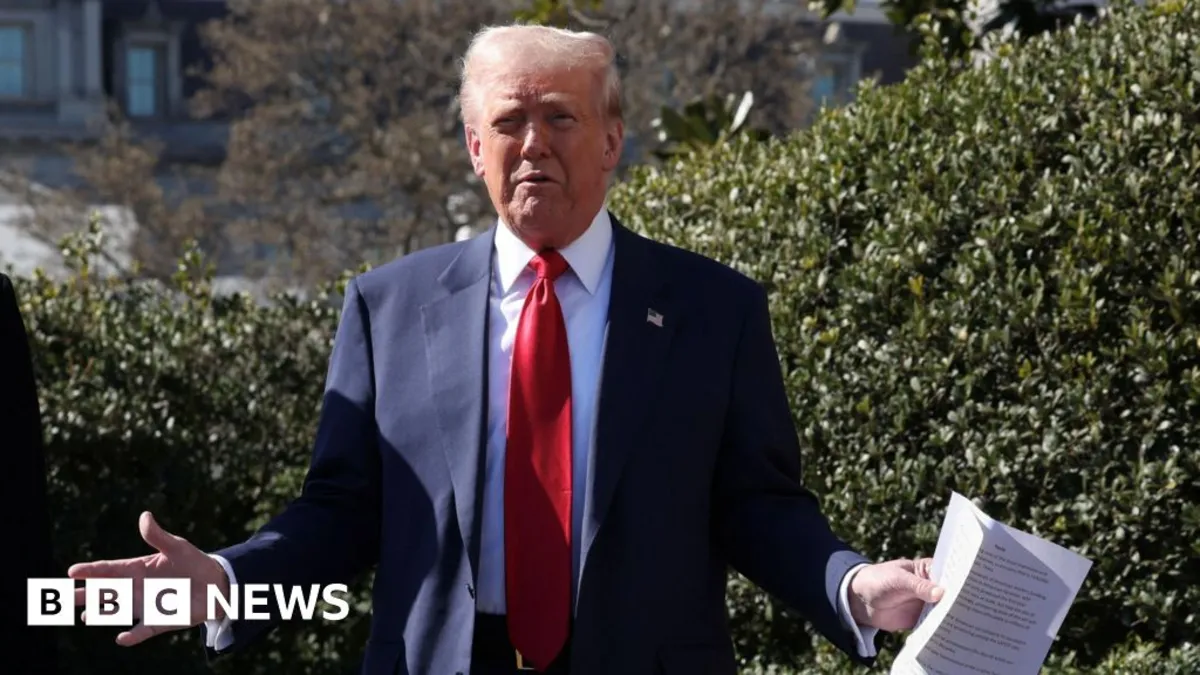
In a significant development, tariffs imposed by US President Donald Trump on imports of steel and aluminium have officially taken effect, intensifying tensions with some of America's largest trading partners. This measure raises a flat duty on steel and aluminium entering the US to an increased rate of 25% and eliminates all country exemptions from these levies.
Several nations, including the UK and Australia, have attempted to secure exemptions from these tariffs but have been unsuccessful. Other countries, such as Canada and the European Union, have indicated they will retaliate against the tariffs. President Trump aims to use these tariffs to boost domestic production in the US steel and aluminium industries, but critics argue that this strategy may lead to increased prices for US consumers and hinder overall economic growth.
The American Iron and Steel Institute (AISI), a group representing US steelmakers, has expressed support for the tariffs, asserting that they will create jobs and enhance domestic steel manufacturing. AISI's president, Kevin Dempsey, stated that the measure closes a system of exemptions, exclusions, and quotas that allowed foreign producers to bypass tariffs. Dempsey commended the president's actions to restore the integrity of tariffs on steel and implement a more robust program to combat unfair trade practices.
The US is a major importer of steel and aluminium, with Canada, Mexico, and Brazil being among its largest suppliers of these metals. With the new tariffs in place, US businesses will face a 25% tax on imported steel and aluminium. This increase is expected to lead to higher costs for numerous US industries, including aerospace, car manufacturing, and construction.
Michael DiMarino, who operates Linda Tool, a 17-person company in Brooklyn that manufactures parts for the aerospace industry, voiced concerns about the impact of these tariffs. "If I have higher prices, I pass them onto my customers. They have higher prices, they pass it onto the consumer," DiMarino remarked. While he supports the push for increased manufacturing in the US, he cautioned that the president's actions could backfire.
The American Automotive Policy Council, which represents major car manufacturers like Ford, General Motors, and Stellantis, echoed similar apprehensions. President Matt Blunt noted that while they are still reviewing the details of the proposed tariffs, the removal of exemptions for Canada and Mexico could significantly increase costs for suppliers.
Some economists warn that although the tariffs may benefit the US steel and aluminium industries, they could adversely affect the broader economy. Bill Reinsch, a former Commerce Department official now with the Center for Strategic and International Studies, stated, "It protects the steel and aluminium industries but hurts downstream users of their products by making them more expensive."
In 2018, during his first presidential term, Trump had initially imposed import tariffs of 25% on steel and 10% on aluminium but later negotiated exemptions for several countries. However, during this latest round, President Trump has made it clear that he will not offer the same exemptions.
In response to the newly enacted tariffs, Australian Prime Minister Anthony Albanese criticized the Trump administration's decision, labeling it "entirely unjustified." He emphasized that such actions contradict the longstanding friendship between the two nations and the economic benefits of their partnership over the past 70 years. Albanese stated that Australia would refrain from instituting reciprocal tariffs, as it would only burden Australian consumers with higher prices.
Meanwhile, Canada's Energy Minister Jonathan Wilkinson announced that Canada would retaliate but clarified that the country is not seeking to escalate tensions. As one of America's closest trade partners and the largest exporter of steel and aluminium to the US, Canada plays a significant role in this trade dynamic. The European Union has also indicated that it plans to respond to Trump's tariffs.
The economic ramifications of Trump's trade tariffs have raised concerns, triggering a selloff in both US and global stock markets. This trend accelerated after President Trump declined to rule out the possibility of an economic recession. The S&P 500 index, which tracks the largest firms listed in the US, fell by 0.7% on Tuesday after experiencing a 2.7% drop on Monday, marking its largest single-day decline since December. The UK's FTSE 100 share index and other European markets, such as France's Cac 40 and Germany's Dax, followed suit with similar declines.
In a recent report, Oxford Economics lowered its US economic growth forecast for the year from 2.4% to 2%, making even steeper adjustments for Canada and Mexico. Despite this downgrade, the report maintained that the US economy is expected to outperform other major advanced economies over the next couple of years, although uncertainty surrounding the future of US tariffs remains at an all-time high.